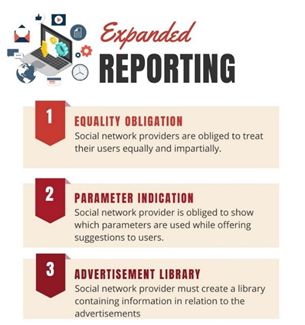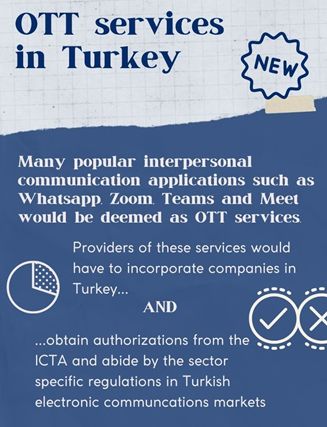Proposed Draft Law Amending the Press Law and Other Certain Laws ("Draft") was submitted to the Presidency of the Turkish Grand National Assembly on 26 May 20221. Although there are several issues addressed within the Draft regarding the press, social media, and internet journalism, we will focus on the amendments about social network providers and "over-the-top" ("OTT", sebekeler üstü) services. Before delving into the details, the following issues constitute an overview regarding general matters, other than subjecting social network providers to additional responsibilities and OTT service providers to ex-ante regulations, that the Draft deals with:
- inclusion of internet news sites as periodicals
- ensuring official announcements and advertisements are published on internet news sites within the framework of certain rules
- determining the duties and authorities of the Access Providers Association (Erisim Saglayicilari Birligi)
- removing the domestic and foreign distinction in catalog crimes
In the following sections of this article, we will first touch upon the increased level of responsibilities introduced for social network providers and then present a synopsis of the regulatory framework established for OTT service providers.
More responsibilities to social network providers

First and foremost, to strengthen the form of communication between users, authorities, and social network providers, a foreign-based social network provider with more than ten million daily access from Turkey, is required to designate at least one authorized natural or legal person as a representative in Turkey, to be responsible technically, administratively, legally and financially, without prejudice to the responsibilities of the social network provider. In case the representative is a natural person, it is proposed to include the obligation to reside in Turkey in addition to the already existing condition to be a Turkish citizen. It must be emphasized that the representative determined by the social network provider would be fully authorized. If this representative is a
legal person, it must be a branch established directly by the social network provider as an equity company (sermaye sirketi).
Moreover, the scope of reporting obligations of social network providers is expanding. Reports are proposed to include information on title tags, algorithms for featured or reduced content, advertising policies, and transparency policies of the social network providers. Following propositions might be useful to present the scope of new reporting fully,
- Equality obligation: It is proposed that social network providers are obliged to treat their users equally and impartially, and they should show this in their reports.
- Parameter indication: Social network provider is obliged to show which parameters are used while offering suggestions to users in a clear and easily accessible manner on their website
- Advertisement library: Social network providers must create a library containing information concerning the advertisements, such as content, advertiser, duration, target audience, and the number of people or groups reached. The library should be published on the website of the social network provider and included in the report.
Apart from the preceding, the Draft foresees other obligations and responsibilities for social network providers, such as providing differentiated services regarding practices for children, responding to information requests received from judicial authorities in a timely and direct manner, protecting user rights, and taking effective measures by issuing a crisis plan in extraordinary situations affecting public safety and public health.
What about OTT services in Turkey?
Before going into details of the Draft, it would be beneficial to provide our readers with some context. Accordingly, providers of electronic communications services, which the Information and Communication Technologies Authority ("ICTA") authorizes within the framework of Electronic Communications Law No. 5809, are subject to certain obligations, including but not limited to those related to consumer rights, protection of personal data, service quality, reporting, and financial obligations. Until now, OTT service providers were able to provide audiovisiual and written interpersonal electronic communications services over the internet, without being authroized by the ICTA and subject to any regulations whatsoever. In the reasoning of the Draft, it is stipulated that this may provide an unfair competitive advantage to OTT service providers vis-à-vis the authorized operators that offer similar services, which fall under the category of electronic communications services (e.g., mobile and fixed communication services). In this context, the Draft aims to oblige OTT service providers to obtain authorization from the ICTA and grant the ICTA the authority to regulate them.
As you may recall, the European Electronic Communications Law ("EECC"), which entered into force in 2018, had expanded the scope of telecommunication services in the European Union ("EU"). With EECC, OTT communication and messaging services such as WhatsApp and Viber were also subject to telecommunications regulations. The inclusion of OTT communication services within the scope of telecommunication legislation in the EU has brought various obligations for the providers of these services. We published a blog post last year. Now, we see the reflections of this development in Turkey, as we suspected.

The Draft aims to define OTT services as a specific type of electronic communications service, establish the necessary legal infrastructure regarding the regulation of these services and grant the ICTA the authority to issue relevant ex-ante regulations. Accordingly, OTT services are defined as "interpersonal electronic communication services within the scope of audio, written and visual communication provided by means of publicly available software to subscribers and users with internet access independently of the operators or the internet service provided". The Draft sets forth that the providers of OTT services would need to incorporate companies in Turkey, which the ICTA would authorize. It also contains a provision that allows ICTA to differentiate the rights and obligations of various OTT service providers based on certain criteria such as the possibility to communicate with numbers included in the National Numbering Plan, the number of users in Turkey, or the number of daily accesses.
It follows from the foregoing that many popular interpersonal communication applications would be deemed as OTT services, and the providers of these services would have to incorporate companies in Turkey, obtain authorizations from the ICTA and abide by the sector-specific regulations in Turkish electronic communications markets. The exact scope of services that would fall under this definition is yet to be clarified by the ICTA.
An administrative fine ranging from TRY one million to thirty million (approx. USD 60 thousand to 1.8 million) may be imposed on unauthorized OTT service providers or in the case of non-compliance with the obligations. The ICTA may decide to reduce the internet traffic bandwidth up to 95% or to block the relevant application or internet access of the OTT providers who do not pay the administrative fine on time and do not fulfill the obligations within six months following the notification to be made by the ICTA or provide services without authorization.
To sum up.
It is eagerly awaited when the Draft will be finalized and how it will be put into practice. It is envisaged to give social network providers and OTT service providers a certain period to comply with the law. At this point, we anticipate that the EU practice will guide all the stakeholders, as always. To all social network and OTT service providers: en garde!
Footnote
1. https://www.tbmm.gov.tr/Yasama/KanunTeklifi/316898 Access Date: 02.06.2022.
The content of this article is intended to provide a general guide to the subject matter. Specialist advice should be sought about your specific circumstances.



